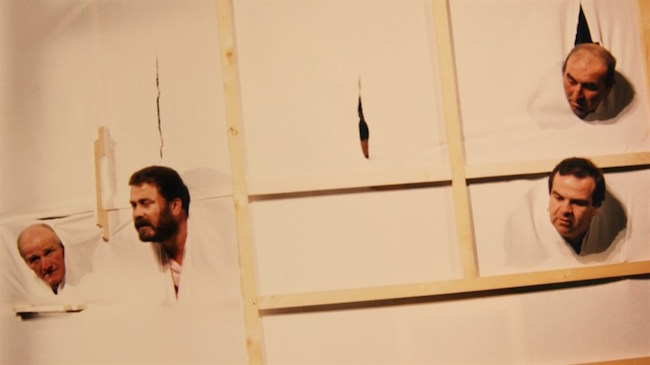Film Review: 2017 Provincetown Film Festival — A Summing Up
Two of the best feature documentaries this year at the Provincetown Film Festival were gay-themed.

A scene from Noël Wells’s winning “Mr. Roosevelt.”
By Gerald Peary
The 19th Provincetown Film Festival, led by artistic director, Lisa Viola, was correct in touting its immense accomplishment this year: starting with Noël Wells’s funky, enjoyable Mr. Roosevelt, the opening night comedy, fully half of the films shown were directed by women. Otherwise, as every year, here was a heartfelt celebration of LGBT rights, and I jumped right in. Fifteen minutes after getting my 2017 press badge, I was in my seat for Shorts Four: Queer Women. As a straight man, I enjoyed perhaps too much Laurel Parmet’s “Spring,” in which a closeted female photographer takes erotic photos of her hot friend. But my political correctness kicked in with an appreciation of “Theater of Desire: Hot Britches,” Shelby Zoe Coley’s important tribute to a much-forgotten pioneering lesbian theater troupe. I also liked Geeta Gandbhir and Jessica Devaney’s “Love the Sinner,” a stirring, intense autobiographical short about Devaney’s fundamentalist mother, caught between the homophobic preachings of her evangelical minister and her primal love for her adult children, two of whom are gay.
The latter actually ended on a hopeful note. Filmmaker Devaney met with a famous Southern conservative minister after the mass killings in Orlando. Perhaps he was already changing, but she helped tilt his attitude about gay people to a far more accepting, genuinely Christian way. As he informed his surprised congregation, he’d evolved past the evangelical credo: “Love the sinner, hate the sin.”
Two of the best feature documentaries this year were gay-themed.
David Barba and James Pellerito’s Anatomy of a Male Ballet Dancer followed the amiable, magnetic American Ballet Theater star, Marcelo Gomes, gliding through principal roles from Swan Lake to Giselle to Don Quixote as he pirouetted around the globe. It also allowed us a privileged look into Gomes’s complicated private life. The openly gay Brazilian, mid-30s, wishes for a life partner and children and, even with his universal success, wants more than anything for his tough-guy father to see him perform in New York. His soccer dad is interviewed back in Brazil, and one feels he has never quite come to terms with Marcelo’s homosexuality.
David France, director of the brilliant AIDS documentary How to Survive a Plague, continues with The Death and Life of Marsha P. Johnson his exemplary obsession to locate forgotten New York gay history (especially militant gay history) and bring it to a film audience. Here he researches the mysterious 1992 death of Johnson, an African-American transvestite who was legendary and beloved in the West Village scene. France shows that it was cross-dressers and street people who were the real heroes of gay rights in New York City, battling the police and even the gay establishment at the time of the Stonewall riots and after. France makes the case: the late Marsha P. Johnson, dead in the waters of the Hudson River, is an American hero.
A Provincetown statue perhaps, in front of City Hall? Marsha in high drag?
Two more feature documentaries also shined at Provincetown.
Theo Anthony’s Rat Film is a lot of things in one, sometimes barely hanging together. But at its center, the grotesque tale of rats gone wild in the streets of Baltimore is a blistering indictment of the city’s dank history of redlining and other blatantly racist government policies. The city’s hopeless rat problem occurs, of course, only where the poorest people live. Black neighborhoods. The sometimes protagonist of this documentary is a low-key African-American exterminator employed by the city, who is philosophical, not easily agitated, after years of doing the little he can to deter the city’s rodent population. His backyard conversations with women in the neighborhood are priceless. What else? A white hunter with a cachet of weaponry and a two-man black team with a fishing rod and a baseball bat go after rats in wacky scenes straight out of Errol Morris.

A scene from the back-stage documentary “Spettacolo.”
Spettacolo comes from the very talented team, Jeff Malmberg and Chris Shellen, behind the much-acclaimed documentary, Marwencol. The main character in Marwencol exorcised his demons by way of his miniature, elaborately constructed soldier city. In Spettacolo, the Tuscany town of Monticchiello was traumatized en masse by a Nazi invasion at the end of the war, in which they barely escaped annihilation. In the decades hence, this tiny town works to escape its frightening collective memory by putting on an annual play, different every year, of social problems and starring the local populace. However amateur, the dramatic event has struck a chord, and people come from across Italy to see the psychodrama performed. Spettacolo is deliberately paced in the continental fashion, and I assumed that the filmmaking couple had hired a master European cinematographer for the shoot. No. What a nice surprise. The luscious camerawork is by co-director Malmberg.
The most talked-about film by far, and mostly negatively, was Mansfield 66/67 co-directed by P. David Ebersole and Todd Hughes. It’s an alternately cutesy and campy and then suddenly serious look at the life of 1950s sex bomb, Jayne Mansfield. I’m not sure that Mansfield, a terrible actress in mostly awful movies and also not a particularily interesting person, deserves a movie about her. In any case, this probably isn’t the one, with its irrelevant dance numbers and its spending far, far, far too much time deciding if Jayne had sold her soul to the Church of Satan. What’s missing: Jayne’s childhood and teen years, or on-screen time with her many surviving children. What almost saves the movie: fabulous interviews with John Waters, Kenneth Anger, and Mary Woronov.
I did have one reservation about Provincetown 2017. The narrative films, often relying on movie stars in their autumnal years, were, as a whole, far too safe and middlebrow. For 2018, I want some P-Town transgression! But what do I know? A film which played out like a well-meaning TV movie–Important Issues, Obvious Villains, Cardboard Characters–won the festival’s Audience Award. Completely unchallenged by it, I walked out of Little Pink House in the middle.
Gerald Peary is a retired film studies professor at Suffolk University, Boston, curator of the Boston University Cinematheque, and the general editor of the “Conversations with Filmmakers” series from the University Press of Mississippi. A critic for the late Boston Phoenix, he is the author of nine books on cinema, writer-director of the documentaries For the Love of Movies: the Story of American Film Criticism and Archie’s Betty, and a featured actor in the 2013 independent narrative Computer Chess.
Tagged: Mansfield 66/67, Mrs Roosevelt, Provincetown Film Festival 2017, Rat Film
